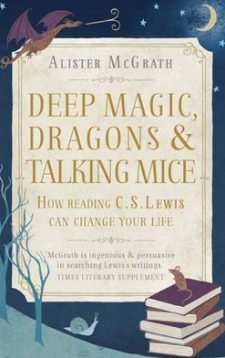Deep Magic, Dragons & Talking Mice
Through the metaphor of conversation, Alister McGrath provides a good introduction to CS Lewis and his ideas
 Deep Magic, Dragons & Talking Mice - How reading C S Lewis can change your life
Deep Magic, Dragons & Talking Mice - How reading C S Lewis can change your life
By Alister McGrath
Hodder and Stoughton, 2014
ISBN No: 978-1-444-75030-0
Reviewed By: John Houseago
The 50th anniversary, in 2013, of C S Lewis’ death has given rise to a number of new books, including a major biography by Alister McGrath (C S Lewis, A Life).
Deep Magic, Dragons & Talking Mice is a valuable contribution to the considerable body of literature surrounding Lewis, which together celebrate a man who was an academic, a Christian apologist and a consummate storyteller.
McGrath invites his readers to imagine being invited to join an after dinner conversation with himself and Lewis to discuss Lewis’ life and thought. Lewis’ ideas are presented either by quotations from his writings or, much more frequently, by McGrath’s interpretations.
The book contains eight imagined conversations in which the meaning of life, friendship, storytelling, Aslan and the Christian life, apologetics, education, the problem of pain and heaven are considered. There are suggestions at the end of the book for further reading.
Through the metaphor of a conversation McGrath succeeds in providing a good introduction to the man and his ideas. He retells the story of Lewis’ gradual and reluctant conversion to Christianity; helpfully drawing attention to Lewis’ belief that ultimately he found atheism to be superficial. Lewis discovered that reason and imagination work together. He did not seek to prove God but to show that Christianity offers a more satisfactory explanation of reality than the alternatives.
McGrath manages to mention and briefly discuss a number of Lewis’ books, helping his readers to see how the Narnia novels connect to each other and how they relate to his earlier apologetic writing. In addition to his books, Lewis published many articles and addresses. A university sermon, “The Weight of Glory”, preached at St Mary the Virgin, Oxford, in 1942, plays a key role in McGrath’s assessment of Lewis.
McGrath makes a powerful case for Lewis’ continued importance as a writer who is able to present Christianity in a winsome and coherent fashion. Part of Lewis’ authenticity came from the fact that his life was shaped by deep suffering; the death of his mother, his experiences in the First World War, difficulties in his academic career at Oxford, the alcoholism of his brother and the death of his wife, Joy Davidman. All these are mentioned within the short compass of this book.
As someone who has never been convinced by talking animals I hoped that McGrath would have said more to persuade me of the value of this literary device. Reepicheep, the chivalrous mouse, only gets two paragraphs, despite the title of the book!
The book lacks an index, and although it is a hardback, it cannot be opened flat.
This is a balanced introduction to Lewis, clearly written, inviting the reader to explore Lewis’ own writings.
The Revd John Houseago is Minister of Broadmead Baptist Church, Bristol
Baptist Times, 19/12/2014